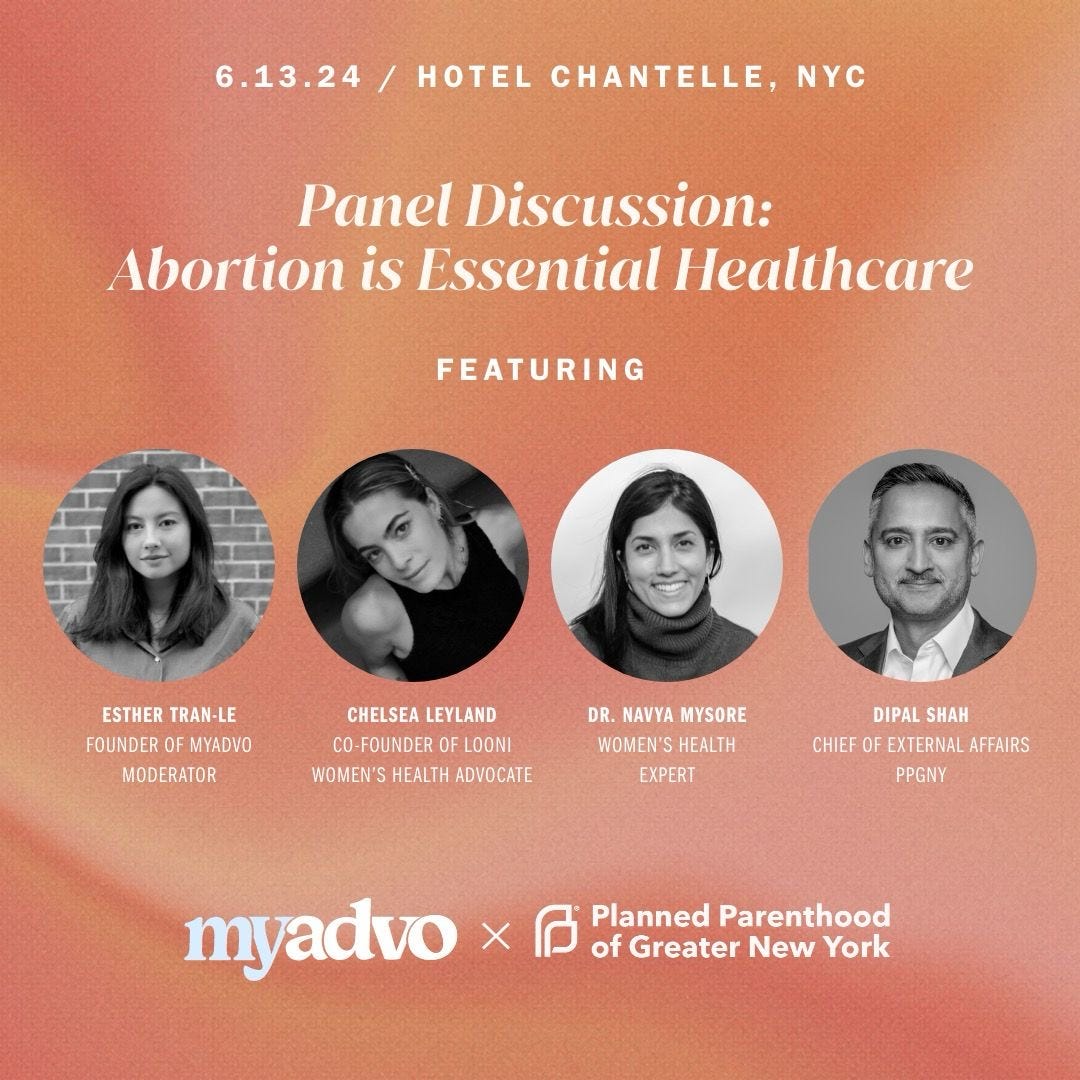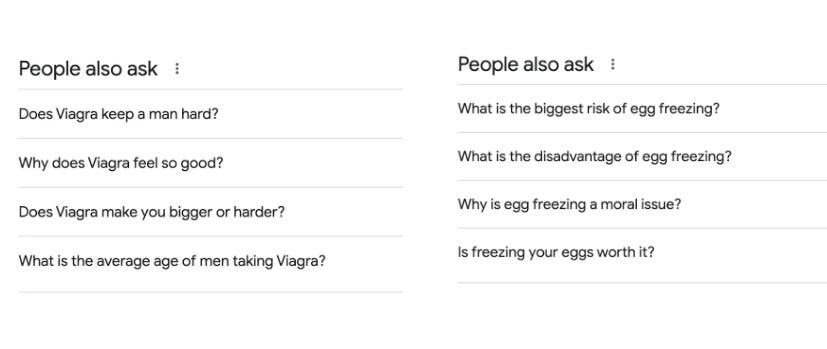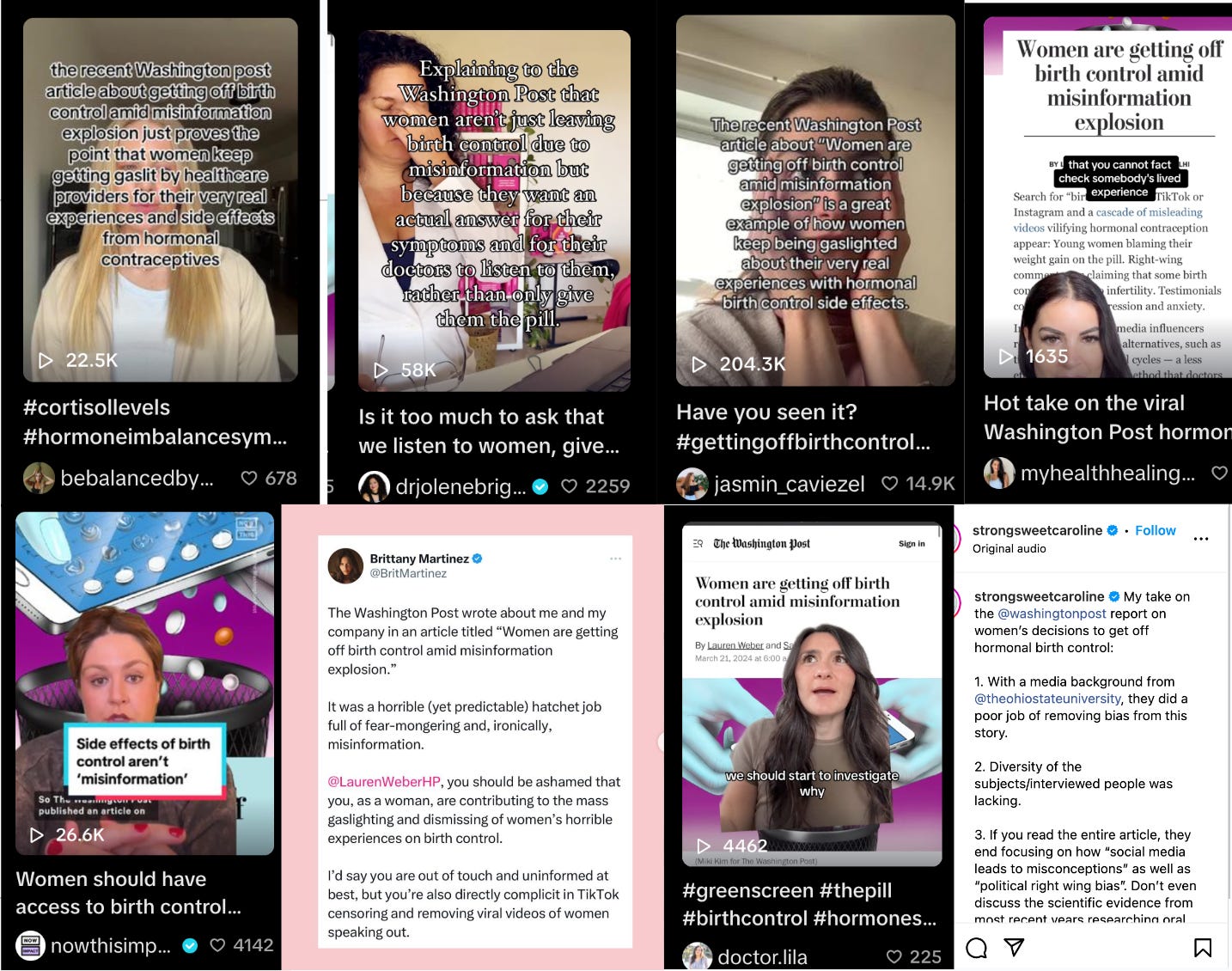Before getting into it, I want to share that MyAdvo is hosting its second event on June 13th in NYC! I’ll be moderating a panel on Why Abortion is Essential Healthcare ahead of the Planned Parenthood Greater NY Fundraiser that our very own Peer Advocate Cait Reeves is organizing. Hope to see you there!
I’ve been thinking about how defensive I felt reading two recent articles about women’s health: Vox’s “The Failed Promise of Egg Freezing” and The Washington Post’s “Women are getting off birth control amid misinformation explosion.” I froze my eggs at 30 years old and had been saving for four years. What was Vox trying to say about my choice? I wasn’t unhappy with my birth control pill when my OB/GYN advised me to stop because of aura migraines, and I’ve enjoyed using Natural Cycles to track my period, especially as I try and understand my fibroids and PCOS symptoms. But according to WashPo, my aura migraines are a “rare” side effect and social media must have brainwashed me. The thing is, I often feel just as overwhelmed when scrolling past health & wellness influencers on social media.
Lately, I’ve noticed an influx of click-baity media with extremely negative outlooks, especially around egg freezing and hormonal birth control, not leaving a lot of room for…choice. The media —traditional and social—can’t help but pit women against each other: Birth control vs. natural family planning, egg freezing vs. no egg freezing, home vs. hospital birth, epidural vs. none, vaginal birth vs. C-section, hormone replacement therapy vs. untreated menopause. What’s another comparison you’ve come across or experienced?
Just for kicks, I did a quick Google search comparing what comes up for Viagra versus Egg Freezing — picking two male and female “reproductive” health topics that some may consider “taboo:” erectile disfunction (ED) for men and fertility for women. Take a look at how positive the current Viagra Google search results are versus egg freezing under “People also ask”:
The judgment is on the page: a health choice a woman makes is stigmatizing versus a man’s. This is echoed in the Vox article that makes fertility clinics out to be scammers. Similarly, in WashPo’s hormonal birth control article, you would think that social media influencers are casting a spell on women to abandon their hormonal birth control.
Reporting on egg freezing opinions vs facts
For context, Vox argues how egg freezing was initially promoted as a revolutionary option for women’s reproductive freedom, but it failed to deliver on its promises given the high costs, physical and emotional toll, and uncertain success rates, which suggests that fertility clinics may be exploiting women’s anxieties for profit. Don’t get me wrong, fertility preservation often feels like a black box. It’s one of the reasons I started MyAdvo, so I could lean on women who’d gone through egg freezing or IVF to tell me more about the process. And yes, egg freezing IS expensive, DOES take a toll on you, and is NOT a guarantee. HOWEVER, castigating the entire fertility preservation process doesn’t exactly feel productive for women who are trying to make an informed choice about whether or not to freeze their eggs. I’m assuming that’s the article’s intended audience, but what do you think?
I also want to point out some stats from the article and others that were left out for comparison:
The chances of natural pregnancy by age (Source: American Society of Reproductive Medicine):
Under 30: 25%
30-34: 20%
35-39: 15%
40+: 5%
The chances of a live birth via IVF by age: (Source: Society for Assisted Reproductive Technology, 2021)
Under age 35: 44.5%
35-37: 32.4%
38-40: 20.2%
41-42: 9.6%
42+: 2.9%
Chances of a live birth from frozen eggs by age: (Source: 2022 NYU Langone Study)
27-44: 39% of patients had a successful birth using their own frozen eggs
Under 38: 50%
Under 38 with more than 20 eggs thawed: 70%
The irony is that Vox’s general premise is how women are misled because they don’t get a full picture of what the path from egg freezing to motherhood is actually like, but it makes you wonder why not actually report on that full picture?
I’m thinking of this part in the article that really irked me:
“The idea that large numbers of people should be freezing eggs in their 20s to guard against future infertility is misguided, some experts say. People in their 20s and early 30s often have time to conceive naturally, without the need for a lengthy, expensive medical procedure. Indeed, only about 12 percent of patients worldwide actually go back for their frozen eggs. Many patients conceive without assistance, Takefman says, while others decide not to become parents. Patients who froze eggs when they were younger than 34 are especially unlikely to use them, Madeira says.”
Why is it so unfathomable to think that a woman may want to plan for a family in her 20s, even if she’s single? The median age for giving birth is now 30, with significant fertility decline starting at 32. Researchers from the NYU Langone study cited in the article emphasize, “It’s the age at which you freeze your eggs that predicts your success rate, not the age at which you use them.” For women with chronic conditions like endometriosis, PCOS or fibroids, is it really “misguided” to consider fertility preservation early on? PCOS and endometriosis each affect 1 in 10 women, so it’s not just a few of us. The experimental label on egg freezing was only removed a decade ago, so that 12% stat feels premature given that many Millennial women are just now starting their motherhood journey. The question I have is, where does that leave women who plan to have children later in life? It’s not until the end of the article that the article briefly mentions how , “Reproductive choices are being eclipsed in this country,” and how “Egg freezing also remains an especially important option for people dealing with cancer or other conditions or treatments that can damage ovarian function, and it can be a useful tool for trans people.” But overall, the tone feels presumptuous and very much, “You’ve been warned.”
Unbalanced reporting on hormonal birth control
In the same vein, The WashPo received backlash for its hormonal birth control because it wasn’t balanced reporting. It featured fear-mongering about women deciding to get off of birth control, cherry-picking anecdotes from doctors who attributed an increase in abortions without citing data. When I read about women’s health, I often find myself looking for the negative space — what’s not being covered? There was a huge miss by not diving into the different types of hormonal birth control side effects. The article doesn’t highlight how we don’t have enough research on side-effects despite the use of hormonal contraceptives being around for over 60 years, which is a big reason why doctors struggle to respond appropriately (Source: Stat). I was pretty flabbergasted that they didn’t at least discuss some of the research, even if international, on how hormonal birth control can affect mental health. The condescension towards women choosing a different path for their reproductive health is palpable.
Women began commenting about how the article failed to acknowledge the real side effects of birth control, continuing the dismissal of legitimate concerns they’ve experienced at the doctor’s office. I actually appreciated the New York Times’ “reply” to the WashPo article about how the notion that influencers are causing hordes of women to quit birth control is hyperbolic: “Usage has been steadily trending upward in the United States; 10 percent of women had prescriptions in 2023, up from 7.1 percent in 2018.” (Source: NYT). The WashPo actually ended up closing the comments because of all the backlash (5.8K comments!), continuing to silence women.
All that being said, I do also see many influencers war on hormonal birth control that also perpetuates pitting women against each other. It’s difficult to scroll past. Women already face medical gaslighting due to a lack of research, which, compounded by unbalanced media and social media misinformation, makes every health choice feel like a personal referendum.
There’s no one size fits all
Empowering women to advocate for themselves means helping them access and understand information about their health while respecting their own choices. To do this successfully, women must be able to consider all possible treatments and evaluate the risks and benefits for themselves. We have two core values as MyAdvo Peer Advocates:
Compassion & Solidarity 🤲: Approach every conversation with empathy. Listen/read attentively and respond with kindness, offering support or valuable feedback. You play a key role in nurturing a supportive and productive environment where everyone can feel understood. Remember, we are stronger together when facing chronic conditions.
Open-Mindedness and Continuous Learning 🌟: Embrace a spirit of open-mindedness and continual learning. Be open to different health experiences and treatment preferences. Avoid using polarizing or righteous language such as, "you should" or "the right way is...," Instead, opt to start any recommendation statements with "in my experience..."
There’s no one size fits all, despite media outlets and the healthcare system often trying to fit us into one. What works as treatment for one person won’t necessarily be right for another. You might even change your treatment plan depending on where you are in life.
In our increasingly polarized world, a binary approach is too familiar but dangerous when it comes to women’s health rights. It perpetuates an environment that invalidates women’s health decisions. The vilifying of options like egg freezing and hormonal birth control—or the choice to not use hormonal birth control—makes it seem like any health choice we make is inherently bad or that we don’t know what’s right for us.
Access to abortion is the epitome of this issue
Access to abortion is the epitome of this issue and is central to what’s at play for women this year. That’s why I want to close this newsletter with an invitation to continue the conversation on women’s health rights at our next MyAdvo event on Thursday, June 13th in NYC.
I’ll be moderating a panel about why abortion is essential healthcare, featuring the following speakers:
Chelsea Leyland, co-founder of Looni and advocate for hormonal health and wellness, who will share her personal experiences with pregnancy loss and abortion as healthcare.
Dipal Shah, Chief External Affairs Officer of Planned Parenthood Greater New York, an influential voice in the fight for reproductive justice.
Dr. Navya Mysore, Previously served as the National Medical Director for Sexual and Reproductive Health at One Medical.
Come party with us afterwards and help raise $10,000 for Planned Parenthood Greater NY! Can’t wait to see you!
MyAdvo Monthly Reads
(policy, podcasts, research, trends & more to advocate for yourself)
🩺 Doctors and medical residents avoiding states with abortion bans
🗞 NYT on how conservative Christian coalition took down Roe v. Wade
⚖️ Florida allows doctors to perform c-sections outside hospital
⚖️ U-FIGHT Act for more funding & research on fibroids introduced by Congresswoman Shontel Brown (OH-11) & Congresswoman Yvette Clarke (NY-09)
⚖️ Bipartisan Endometriosis Care ACT that unlocks $50M annually to advance endometriosis research and expand access to treatment introduced to congress
💊 Medication for High Blood Pressure May Lower Risk of Uterine Fibroids
⭐️ Olivia Munn on freezing her eggs 3 times after breast cancer diagnosis and hysterectomy decision
⭐️ Bindi Irwin Receives Blossom Award at EndoFound Gala
❤️ GoFundMe for Veronika Denner, Yale alumna and Oxford MSc student






